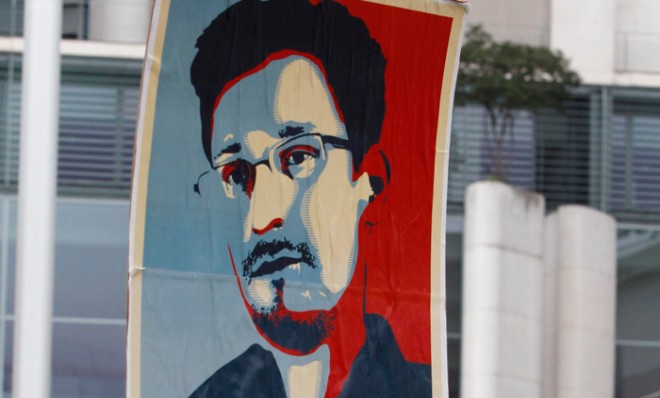Person of the year: Edward Snowden or the Pope
The most influential person of 2013


Even if you find people rankings tendentious, Time's Person of the Year provides a good opportunity to slow down and think. Since Time is an U.S.-centric publication with international editions, the criteria — the person who "for better or for worse...has done the most to influence the events of the year" — should be read to mean, I think, the person who has had the most impact on America, construed broadly.
This year, there is only one logical choice: Edward Snowden.
A 29-year-old managed to kneecap the most powerful institution on the face of the planet. His weapons were the secrets collected by its most powerful intelligence agency, and his methods were taught to him by secret-keepers themselves. More than health-care reform, more than the budget fight, more than the crisis in Syria, the prestige and power of the United States has been most damaged by Snowden's revelations.
The Week
Escape your echo chamber. Get the facts behind the news, plus analysis from multiple perspectives.

Sign up for The Week's Free Newsletters
From our morning news briefing to a weekly Good News Newsletter, get the best of The Week delivered directly to your inbox.
From our morning news briefing to a weekly Good News Newsletter, get the best of The Week delivered directly to your inbox.
In many ways, I think the Snowden revelations are the largest source of background noise and the functional cause of President Obama's falling approval ratings. They were, of course, the direct catalyst for a significant (and perhaps quite productive) public debate about intelligence, technology, and power surveillance.
The arguments against selecting Snowden fall into two categories: It would be immoral to reward a possible traitor with such a recognition, and Snowden's revelations have not yet led to any measurable retraction of the secret state. The moral question isn't operative. It doesn't matter for this discussion whether you think Snowden is a hero, a true patriot, a brave whistle-blower, or a villain, or whether you think he is a narcissist who managed to co-opt the privacy rights movement, or whether you think he is a pawn in a Russian spy game. It does matter that he is an ideological entrepreneur, one who exploited NSA's technological and cultural blind spots to create a single-point failure that has cascaded around the world.
Number two, in my opinion, is Pope Francis, the former Jorge Mario Bergoglio. His effects on the Catholic Church may be significant enough to reverse years of decline and stagnation. His Jesus-centric, works-focused ministry, his technological savvy, and his sense of humor have made universal compassion and good works popular again in Rome, and may energize the laity.
A free daily email with the biggest news stories of the day – and the best features from TheWeek.com
Marc Ambinder is TheWeek.com's editor-at-large. He is the author, with D.B. Grady, of The Command and Deep State: Inside the Government Secrecy Industry. Marc is also a contributing editor for The Atlantic and GQ. Formerly, he served as White House correspondent for National Journal, chief political consultant for CBS News, and politics editor at The Atlantic. Marc is a 2001 graduate of Harvard. He is married to Michael Park, a corporate strategy consultant, and lives in Los Angeles.
-
 Will AI kill the smartphone?
Will AI kill the smartphone?In The Spotlight OpenAI and Meta want to unseat the ‘Lennon and McCartney’ of the gadget era
-
 Must-see bookshops around the UK
Must-see bookshops around the UKThe Week Recommends Lose yourself in beautiful surroundings, whiling away the hours looking for a good book
-
 A Nipah virus outbreak in India has brought back Covid-era surveillance
A Nipah virus outbreak in India has brought back Covid-era surveillanceUnder the radar The disease can spread through animals and humans
-
 Why Puerto Rico is starving
Why Puerto Rico is starvingThe Explainer Thanks to poor policy design, congressional dithering, and a hostile White House, hundreds of thousands of the most vulnerable Puerto Ricans are about to go hungry
-
 Why on Earth does the Olympics still refer to hundreds of athletes as 'ladies'?
Why on Earth does the Olympics still refer to hundreds of athletes as 'ladies'?The Explainer Stop it. Just stop.
-
 How to ride out the apocalypse in a big city
How to ride out the apocalypse in a big cityThe Explainer So you live in a city and don't want to die a fiery death ...
-
 Puerto Rico, lost in limbo
Puerto Rico, lost in limboThe Explainer Puerto Ricans are Americans, but have a vague legal status that will impair the island's recovery
-
 American barbarism
American barbarismThe Explainer What the Las Vegas massacre reveals about the veneer of our civilization
-
 Welfare's customer service problem
Welfare's customer service problemThe Explainer Its intentionally mean bureaucracy is crushing poor Americans
-
 Nothing about 'blood and soil' is American
Nothing about 'blood and soil' is AmericanThe Explainer Here's what the vile neo-Nazi slogan really means
-
 Don't let cell phones ruin America's national parks
Don't let cell phones ruin America's national parksThe Explainer As John Muir wrote, "Only by going alone in silence ... can one truly get into the heart of the wilderness"
